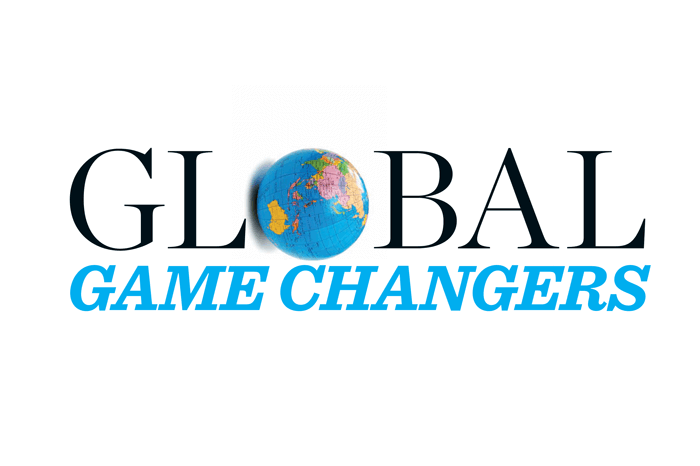
25 Portlanders Who Are Changing the World
Portland will never have New York’s money, DC’s clout, or London’s connections. But for a new class of idealists, organizers, doers, and innovators, humble Stumptown has become its own kind of capital city for global action.
In the fields of international aid, humanitarian relief, and socially conscious business, Portland has a few bastions of expertise. MercyCorps runs relief and aid operations in 44 countries from imposing headquarters by Skidmore Fountain. Medical Teams International and the Nike Foundation’s Girl Effect boast global heft and healthy budgets. But ambitious new efforts are popping up everywhere, often powered more by entrepreneurial passion than cash.
New and old, big and small, the city’s international players are creating a distinctively Portland way to attack problems on the far side of the world. The major established organizations team up with tiny start-up companies. Brand-new efforts leverage creative talent and Portland’s famed DIY spirit to present slick, professional images—even while operating from a kitchen table. A tight-knit, collaborative culture helps designers, scientists, social-capitalists, and activists launch new ideas fast.
The resulting movement doesn’t draw as much attention as the latest business news or political maneuver, but maybe it should. “It’s quite remarkable,” says Doug Stamm, who keeps an eye on Portland’s philanthropic world from his post as the head of the Meyer Memorial Trust. “We don’t attract many multinational corporations, but we attract cutting-edge international aid organizations.”

On the following pages, we introduce 25 organizations, people, projects, and ideas—some established, most on the rise—that exemplify Portland’s growing global reach.

Image: Joni Kabana
CINDY KAPLAN & SPOON FOUNDATION

A Portland mom aims to revolutionize orphans’ nutrition.
spoonfoundation.org
When Jadyn Kaplan’s mom coaxes him to tell a visiting reporter where he was born, the 7-year-old answers with mischievous nonsense: “The park.” A slight, sweet boy who avoids eye contact, Jadyn wasn’t born in a park, but in Kazakhstan. Malnourishment in the hospital where he spent his earliest days indelibly marked his cognitive and motor development.
“When we first met him, we thought, this doesn’t look like a healthy baby boy,” says Cindy Kaplan, who, with her husband, adopted Jadyn in 2006. “But we were in love. It was just part of what we were handed as parents.”
Beyond a son, Kaplan discovered an overlooked issue and unexpected calling. She wanted to work for an organization dedicated to improving nutrition in orphanages around the world. She couldn’t find one. So, along with another Portland mother of an adopted Kazakh child, she started one.
Six years later, Spoon Foundation runs nutrition training and feeding programs in orphanages in Kazakhstan, China, India, Haiti, and Tajikistan. After starting with Kaplan’s kitchen table as an office, the organization’s budget will approximately double from 2012 to 2013, to a projected $1.3 million.
Spoon works to address a distinct and nuanced problem: orphanages in developing countries often have adequate food, but their staffs may lack the training to feed infants and young children in ways that allow their bodies to metabolize nutrients properly. (For example, Kaplan says, Kazakh “baby houses” often force infants to eat too quickly.) Spoon works with in-country partners to provide both food aid and, as important, training and policy to improve feeding practices. In Kazakhstan, for example, Spoon lobbied successfully for a law raising national nutrition standards for orphanages.
“We thought it would be easy—like, we’re going to just buy vitamins and send them over,” Kaplan says. “It’s complex to explain. We can’t just say, ‘A dollar will go to a meal for this child.’”
Kaplan says that her nascent organization looks to Oregon’s cluster of international aid experts. Holt International, a highly regarded Eugene-based international adoption agency, is a partner. Executives from Portland’s MercyCorps mentored her. “The community here is more accessible than if we were in, say, DC,” Kaplan says. “The relationships come easier and feel more natural, and everybody seems to be driven by the true value of what they’re doing for other people.”
Kaplan and her husband adopted a Kazakh girl, Nevya, in 2010. Kaplan says their family feels even bigger: “People say, ‘You think you’ll have more?’ I say, ‘I think I have thousands and thousands.’” —JF
EVAN THOMAS

A complex collaboration takes Portland technology to the world.
sweetlab.org
Portland State professor Evan Thomas runs the school’s SweetLab, specializing in “sustainable water, energy, and environmental technologies.” The lab develops digital sensors to monitor water filters, cookstoves, and other equipment deployed in remote communities. “We show how international aid is actually working,” the 29-year-old NASA veteran says. “Engineers often use instruments to test programs. We bring that same rigor.” Thomas’s operation also shows how one Portland effort leverages a school, major charities, for-profit companies, and global connections. —ZD
Portland State’s SWEETLab
In a cluttered lab in PSU’s engineering building, Thomas and two postgrad engineers test battery-powered monitors. “They’re low-power, but report high-quality data to the Internet over cell-phone networks,” he says. “I can sit in New York, and remotely reconfigure a sensor in India. You can be in Portland and see how well a water pump in Rwanda is working.”
money
The Gates Foundation
The mammoth foundation contributed $20,000 in grants to develop and deploy sensors.
money
Oregon BEST
A tech-development nonprofit established by the state awarded $200,000 through grants to develop and commercialize the sensor technology.
money
MercyCorps
The Portland-based international aid agency granted $80,000 for sensors in Haiti and Indonesia.
money
USAID
Thomas’s project is tied to a grant from the State Department’s development arm through a partnership with UC Berkeley.
money
The Lemelson Foundation
The Portland-based charity endowed by inventor Jerome Lemelson granted $100,000 to support sensor development.
support
The London School of Hygiene and Tropical Medicine
A 114-year-old UK research institution will analyze data collected in the field.
start-ups
DelAgua
A private company is setting up a $50 million project to monitor water quality for 600,000 households in Rwanda.
support
Rwanda’s Ministry of Health
The government agency handles distribution and training.
start-ups
SWEETSense
A private company co-owned by PSU sells and implements monitors in 10 countries, including Haiti, Kenya, Indonesia, India, and South Africa.
tech
EcoZoom
A Portland company makes clean-air cookstoves and works with Thomas’s company.
tech
Stevens Water
A 101-year-old Portland water-monitoring company contributed $500,000 worth of work.

Thomas travels frequently even as he runs the lab and teaches PSU classes. Two typical flight itineraries:
PDX > Amsterdam > Kigali, Rwanda
PDX > Tokyo > Jakarta, Indonesia
JASON FILETA

A Christian activist group leverages Portland’s DIY mojo.
micahchallengeusa.org
“The Micah Challenge is a worldwide campaign to end extreme poverty. We mobilize churches and Christians to push policy makers on poverty-related issues. We’re advocates, basically. Other organizations are so good at delivering relief and aid. We try to be the political face of that aid. As one example, we mobilized conservative evangelical churches to pressure the Bush administration to keep funding developing-world AIDS relief.
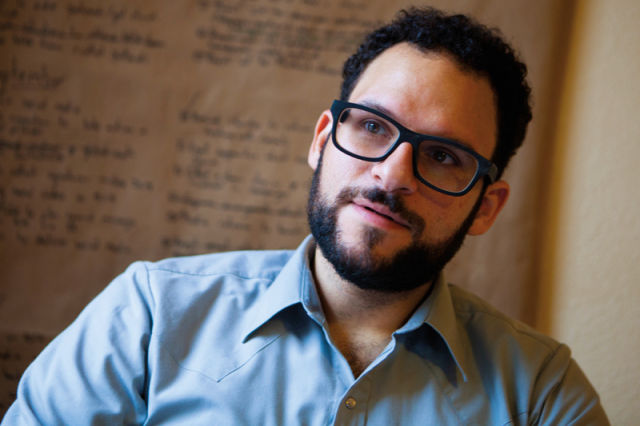
Image: Joni Kabana
We’re in about 50 countries, and have a small global staff in London. Portland is our only US office. We can be here because Portland is a culture-making city. There’s an abundance of creative genius just walking around on the street.
Earlier this year, a fundraising site called Live58.org planned to feature the Micah Challenge—a huge opportunity for us. In fact, we built money into our budget based on it. There was a mis-communication about who was making a particular video we needed that came to light just six days before we needed it.
I sent an e-mail to three people I sort of knew. It started, ‘I hate being this guy, but somehow here I am.’ A freelance art director named Daniel Palmer got back to me with an incredibly detailed list of what equipment we needed, and a very firm sense that it could be done. That was Tuesday.
Wednesday and Thursday we called all over town to rent the gear; it came to about $300. Daniel shot the video on Friday in our offices downtown. We edited it Saturday and Sunday. Meanwhile, Daniel’s wife wrote the text that appears on screen, and they composed a musical score. We submitted it Monday.
Right away, the feedback from the site was that this was some of their best content ever. That $300 video—Daniel and his wife worked for free—helped us raise $8,000, which is 8 percent of a budget that funds our activism.
I think that’s almost an only-in-Portland thing. People here, and not just religious people, get us and want to help. And there’s just a ton of talent.” As told to Zach Dundas
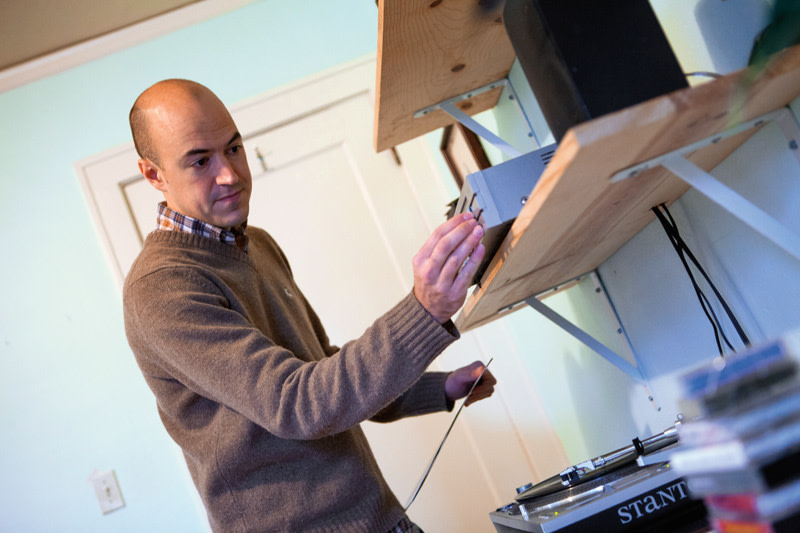
Image: Joni Kabana
Sahel Sounds

A globetrotting Portland record label helps musicians stranded by war.
sahelsounds.com
The West African country of Mali produces musical superstars: Ali Farka Toure, Oumou Sangare, Amadou & Mariam, and others have made the leap from domestic renown to global success. Even as those artists rack up Grammy nominations, however, the small villages and towns of northern Mali conceal a wildly diverse musical universe, where musicians create everything from bluesy acoustic jams to the latest in glossy, digitally processed hip-hop.
Since 2009, Portland native Christopher Kirkley has traveled northern Mali (and neighboring countries) armed with only a recorder and a keen appetite for musical discovery. After his blogged recordings achieved some underground popularity, he launched Sahel Sounds, a tiny record label that releases a vivid array of vinyl records and downloads from off-the-grid Mali.
In the past year, however, the landlocked nation at the center of Kirkley’s effort has gone silent.
“It’s chaos,” Kirkley says. “Everyone in the northern part of the country has left. It’s a mass exodus.”
Islamist militants have seized control of northern Mali, leaving the once stable democratic nation in a state of civil war. The rebels have instituted strict Shariah law in the territory they control, banning music and displacing artists Kirkley works with.
“My friends are in refugee camps,” he says, “or they’re fighting, or they’re in a village somewhere with no electricity.” Last fall, Kirkley put together Songs for the North Country, a benefit compilation of tracks he recorded in the region. It’s a beautifully curated collection, with delicate acoustic ballads and a cappella laments melting into the sounds of a market in the city of Gao or the groan of camels recorded in the Sahara.
For Kirkley, the most important part of this download-only set (sold exclusively through online retailer Bandcamp) is that all money earned will go straight to the six featured artists. Sales had generated a modest four-figure contribution at press time, but Kirkley says even small payouts go a long way in the conflict zone.
“I don’t like to sell this idea of my friends being victims,” he says. “But I have to balance that with my own concern with their needs. That’s all they talk about. They say, ‘We don’t care how much it is, we just need something right now.’” —RH
Sseko Designs

A Portland brand’s fashion-forward East African operation
ssekodesigns.com
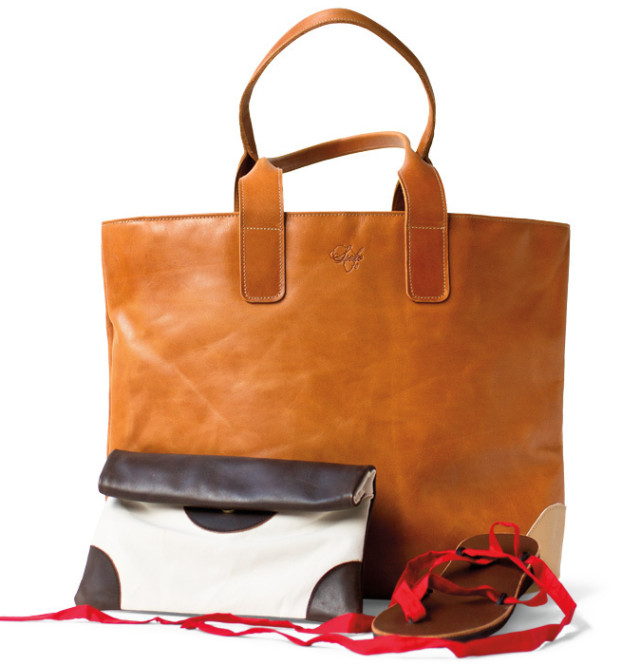
Image: Kate Madden
When Liz Bohannon worked in Kampala, Uganda, after college, the Kansas City transplant discovered an odd problem: a mandatory nine-month gap between high school and college often derailed qualified female students. “They’d go home to their villages, and there was no work,” Bohannon says. “So they couldn’t afford to start school.”
From Portland headquarters, she and husband Ben Bohannon now run Sseko (“say-ko”) Designs, Uganda’s largest footwear exporter. (“That says more about Uganda’s exports than about us,” Ben says.) And they employ 35 people to make sandals and bags—some as regular full-timers, others in “university-track” positions that earn tuition-matching grants.
Portland attracted the couple in 2011 partly with its apparel industry, but also because they felt at home. “Kansas City isn’t that entrepreneurial,” Liz says. “People supported us, but we were the oddballs without 401Ks. In Portland, it’s more like, ‘Oh, you too?’” —ZD
The Sandals
Sseko’s flagship product consists of a base and a separate ribbon-like strap that can be configured at least 150 ways. “How do we create variety and novelty,” Liz says, “but not have it be disposable fast-fashion?”
The Tote Bag
For its newest product line, Sseko began manufacturing in Kenya. “You can make beautiful, high-quality merchandise in East Africa,” Ben says. “I’d love to sit down with Nike or Columbia one day and say, look, this is what’s possible there. A major production facility would make a huge difference in Uganda.”
The Clutch
The company’s expansion into new products, like its line of clutches, reflects a desire to mature and employ college graduates as well as hopefuls. “Education is obviously crucial,” Liz says, “but qualified people also need an economy that’s more developed. We’d like to hire managers and designers.”
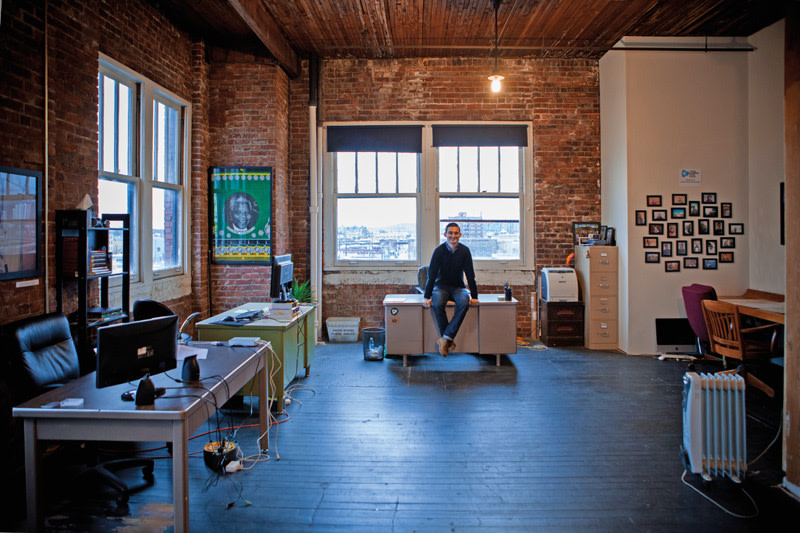
Image: Joni Kabana
Justin Zoradi

A new nonprofit links a Portland couch to Cape Town kids
thesenumbers.org
In 2004, Justin Zoradi graduated from college in Santa Barbara, burning with idealism. His mentors told him to ditch dreamy California for somewhere real. He agreed, and a stint in Belfast counseling Catholic and Protestant kids on conflict resolution led to a trip to Cape Town, South Africa.
“I met these cool, smart South African high school students, top-10 in their graduating classes,” Zoradi says now. “And they couldn’t afford the $2,500 college costs there. I had my $40,000-a-year degree. Something gripped me.”
Today, Zoradi, 30, leads a nonprofit called These Numbers Have Faces from a brick-walled loft in Portland’s Central Eastside. Zoradi and four other Portland staffers steer about $200,000 a year in scholarships to students in South Africa and Rwanda. Recipients are starting to graduate from colleges and trade schools; each must pledge a year’s tuition for someone else once they’re working.
Zoradi’s progress says a lot about how a rising generation of no-budget organizers use Portland as a global base. His path from here will test our DIY ethic’s capacity to scale up.
Zoradi founded TNHF after landing in Portland for grad school, with the help of a how-to book he bought at Powell’s. In 2008, his first year, he scraped together about $8,000, enough to help two South African kids he already knew. “I thought that might be it,” he says now. “I had no money myself.” Then he started to hear from other students, whom he’d never met. “I was like, ‘What have I done?’”
At first, TNHF was Zoradi and his laptop, stationed on the couch in his Chinatown apartment, begging friends and relations for money. Then the attic of a rented house at SE 84th Avenue and Foster Boulevard became his offices. “That’s where my first intern showed up to work,” he says.
But from the beginning, Portland contacts helped Zoradi look good and get organized. He recruited an ad hoc board of advisers. At one point, he traded some Nike swag he’d acquired for graphic design services. “That’s this town and this time,” he says. “People from organizations elsewhere are shocked at what we spend on marketing and design: basically nothing.” The Central Eastside provides cheap rent; Skype and a popular free global-texting app provide communications.
Zoradi now faces the challenge of making scrappy success last and grow. Eighty percent of TNHF’s current money comes from individual donors—Zoradi hasn’t quite tapped the richer veins of corporate or foundation funding. The organization is relatively unknown even in local international-development circles. And expanding ambitions—TNHF plans to launch in Uganda this spring—make him just as nervous as excited.
“I live in fear every single day,” he says. “All of a sudden, I’ve got employees and dozens of kids in Africa depending on me doing my job well. Will we get funding? And is it working? The forces we’re up against are just immense.”
Still, he’s determined to sustain the spirit that got him off the Chinatown couch. “I have friends in the tech start-up world,” he says. “I take their mantra: fake it till you make it. Throw the wings on while you’re going down the runway.” —ZD
JULIA PLOWMAN
A veteran of Nike’s Girl Effect talks about the power of branding and Portland’s global potential.
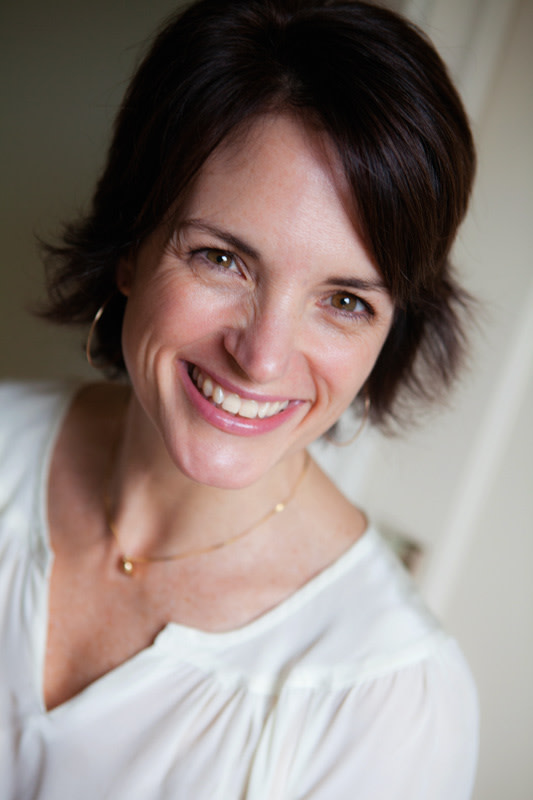
Image: Joni Kabana
You helped develop the Girl Effect, the campaign to channel aid to adolescent girls that’s become the focus of Nike’s $30 million–a–year charitable foundation. How did you get there?
I came here from New York to work at Wieden & Kennedy. I helped start WK’s Tokyo office, then went to the Amsterdam office. I thought I’d be there for six months. I met my husband there and stayed for seven years.
When we decided it was time to come back to the States, we thought Portland would be the perfect place. I left WK when I wanted to use my international experience at a major foundation.
The Swoosh carries plenty of weight. Why “The Girl Effect,” which has no overt Nike connection?
A million white papers had been written about helping adolescent girls around the world as a way to break cyclical poverty. Not much had been done. Girls were always lumped in with either “women” or “youth.” The problem is huge, way bigger than Nike. So what could we contribute? What does Nike do uniquely well? Branding.
Girl Effect, very intentionally, is not branded as Nike. Other partners can get involved with it and feel like they own it. And it’s great to see a session at Davos about girls, and Bill Clinton talking about the issue at Clinton Global Initiative. None of that used to happen. But the popular response—hearing people use the term “girl effect” as a figure of speech—has been just as amazing.
Then you left: first to World Pulse, a small, new nonprofit that gives developing-world women access to digital media. Now you’re a freelance consultant, working with Mercy Corps on its brand. What have you learned?
What’s possible, and what’s necessary. Start-ups have great passion and ideas, but struggle to make that operational. Everyone’s in scrappy, seat-of-the-pants mode. They want to do everything and talk to everyone. The challenge is to get beyond that. You need clarity and focus.
Branding is a big part of that. Small organizations or companies tend to view branding as a luxury, and that’s a mistake. A good brand helps define strategy. And strategy really needs to shape the organization. At World Pulse, the work was great and the mission was brilliant, but they needed a structure. I was hired as COO, and as I was figuring things out I realized that strategically the organization didn’t need someone in that job. So I eliminated my own position. I kind of couldn’t believe it.
Wouldn’t New York, DC, or London be better as home base for your work?
It can be good that you’re not in New York or DC. There, you’re just one of thousands. In Portland, you have to be adventurous and outward-looking. The base of the culture here is a pioneering spirit, which brings creativity and grit. We attract people who believe they can reshape the future. —ZD


LOOPTWORKS’ TABLET CASES
WHO The Portland-based “up-cycling” company, founded 2009, makes apparel and accessories out
of material discarded at overseas textile factories.
WHAT In November 2011, one of the world’s largest leather tannery companies told Looptworks founder Scott Hamlin it tossed 4,500 pounds of leather every day in Vietnam and China. Solution: turn the refuse into stitched slipcases for iPads and other digital tablets, retailing for up to $80.
WHY One Looptworks case requires 4,000 fewer gallons of water to produce than a similar product made with fresh material. So far, the company has sold several thousand.
HOW “This tannery company sells to all the big guys here,” Hamlin says. “They heard about us through the press, but had a sales agent here because of the strength of Portland’s apparel industry.” —ZD

OUR FAMILY IN AFRICA
WHO From her base in Camas, Washington, Jilma Meneses orchestrates aid to orphans in Congo.
WHAT Founded after Meneses, now 47, visited the Democratic Republic of Congo in 2001, OFA provides housing and supplies to orphans. Recently, volunteers at a southern Congo hospital trained locals to make a nutrient-rich peanut-butter paste to address malnutrition.
WHY “These are truly beautiful, strong people who have survived the worst genocide in the world,” says Meneses, who also works as Portland State’s chief diversity officer.
HOW Meneses taps volunteers steeped in Portland’s tech scene to help adopted kids stay in touch with each other through private social media sites and blogs. —TF

WORLD PULSE
WHO This nine-year-old Portland organization provides grassroots media access and training to women in developing countries.
WHAT With an emphasis on blogging, World Pulse’s specialized social network caters to women who access the web via small-town Internet cafés and cell phones. A Portland-based editorial team picks the best user-generated content and syndicates it to major media organizations like Reuters and CNN.
WHY “We’re building a basic media infrastructure for people who don’t have it,” says founder Jensine Larsen. “How do you use Skype? What’s the most effective way to use Facebook?”
HOW World Pulse draws on volunteers from Intel and the local open-source software scene to help support its tech platform. —ZD

MEDICAL TEAMS INTERNATIONAL’S CAMBODIAN TRAINING PROGRAM
WHO Medical Teams International operates in 70 nations, but new president and former Horizon Air CEO Jeff Pinneo wants the relief org—founded in Portland in 1979 in response to the Cambodian killing fields—to stay close to its roots.
WHAT Since 2000, MTI has trained more than 700 Cambodian first responders in first aid and EMT skills.
WHY With about five people killed every day in a nation of 14 million, the country’s automotive fatality rate is one of the world’s worst.
HOW Medical Teams’ Portland supply distribution center is staffed by 250 local volunteers. —RD

QUECHUA BENEFIT
WHO Mike Safley founded the nonprofit based in Portland and Peru in 1996.
WHAT Quechua Benefit provides medical care, shelter, food, and social services to the Quechua, Peru’s indigenous people. This past fall, the organization opened a 16,000-square-foot village called Casa Chapi, which can house 100 children with cottages, a greenhouse, shops, a health center, and a library.
WHY “The Quechua people have largely been forgotten by their own country,” says Daryl Gohl, the organization’s current president.
HOW Northwest farms are home to 20 percent of the US population of alpacas, the Quechua’s traditional source of cashmere-like fiber, forging cultural and business links between the regions.—LL

SAGE CLASSROOM
WHO Portland State architecture profs (and spouses) Sergio Palleroni and Margarette Leite led a student team to design a hypergreen prefab classroom.
WHAT A single unit will cost about $75,000, competitive with a standard US modular classroom. A prototype now being tested in Gervais, Oregon, will help the design team devise adaptations for different climates. Canadian manufacturers and Planned Parenthood, which wants to deploy mobile health clinics in Latin America, are interested.
WHY “Everyone wants green building, but it’s been hard to get costs down,” Leite says. “There are 350,000 modular classrooms in the US alone. The global potential is huge.”
HOW Prototyped with help from the state and destined for mass manufacture by a long-standing Oregon prefab builder, the Sage uses nontoxic materials, insulation that stores and releases heat, and steel flooring to speed installation. —ZD

PRECIVA
WHO In 2005, Oregon Health & Science University researcher Anais Tuepker and physicist hubby Craig Miller launched Preciva, a start-up aiming to develop rapid, cheap screening technology for cervical cancer.
WHAT After raising $11,000 via a Kickstarter-like website, the small company prototyped a portable scanning unit that maps a woman’s cervix in real time. This year, field tests start in Bangalore, India.
WHY “In India, maybe 6 percent of women get screened,” Tuepker says. “With our test, you don’t need a lab, you read results right away on a smartphone, and it’s about $2 per test.”
HOW Tuepker and Miller formed the for-profit Preciva as a B Corp-certified (think LEED for businesses) firm with support from Portland State’s Social Innovation Incubator. —RD

WARM CURRENT
WHO Portland surfers John Koenig and Ryan Cruse founded the nonprofit in 2008.
WHAT They dispatch used surf gear to Mexico, Chile, and Morocco.
WHY While surfers flock to places like Peru’s Trujillo Province and Morocco’s Atlantic Coast, people who actually live there often can’t afford to participate in the sport.
HOW Warm Current, which gathers its donated equipment around the Northwest, also stages surf workshops for kids here who would ordinarily lack access to the sport. —GP

COUNCIL FOR RESPONSIBLE SPORT
councilforresponsiblesport.org
WHO This “virtual organization”—no office, one staff member—with an all-Portland board certifies the environmental and social practices of sporting events, including Eugene’s 2012 Olympic Trials, Britain’s Paralympic training camp, and marathons in Venezuela and Italy.
WHAT Just as LEED ratings indicate green construction, CRS’s “ReSport” program defines standards on issues ranging from waste diversion to handicapped access.
WHY “I like to cut through any vagueness or greenwashing,” says executive director Keith Peters.
HOW The CRS board was recruited from Portland’s sportswear, legal, and charitable circles; the Timbers and Spirit Mountain have ponied up grants; Wieden & Kennedy offered pro bono branding. —RD

AL JUBITZ & CYPRUS
WHO The scion of the truck stop empire fosters citizen diplomacy in Cyprus, a Mediterranean island nation split between Greek and Turkish factions.
WHAT The 68-year-old Jubitz organizes meetings of leaders from both sides of the ethnic divide (the next is scheduled for Malta in March) and a program, based on similar efforts in Northern Ireland, that brings Turkish and Greek teens to live together in the US.
WHY Jubitz’s foundation has a number of emphases, including education and the environment, but peacemaking is his personal focus.
HOW Connections made through a pair of Portland State professors—one Greek, one Turkish—have been key to Jubitz’s efforts. —ZD

HANDS TO HEARTS INTERNATIONAL
WHO Laura Peterson founded this Portland nonprofit to improve child care, parenting, and women’s social development.
WHAT HHI trains caregivers in India, Uganda, and the US on language skills, cognitive development, and other skills. (The organization has also been active in Russia and Swaziland.) About 30,000 adults have participated in its programs so far.
WHY “There’s not much training in how to take care of a child,” Peterson says. “A simple lecture on hygiene can be vitally important.”
HOW “Portland has an amazing brain trust: people who worked for the World Bank, people who worked in Pakistan for 30 years, people who literally wrote the book on women’s development. They choose to be here, and we tap into their expertise.”—LL

